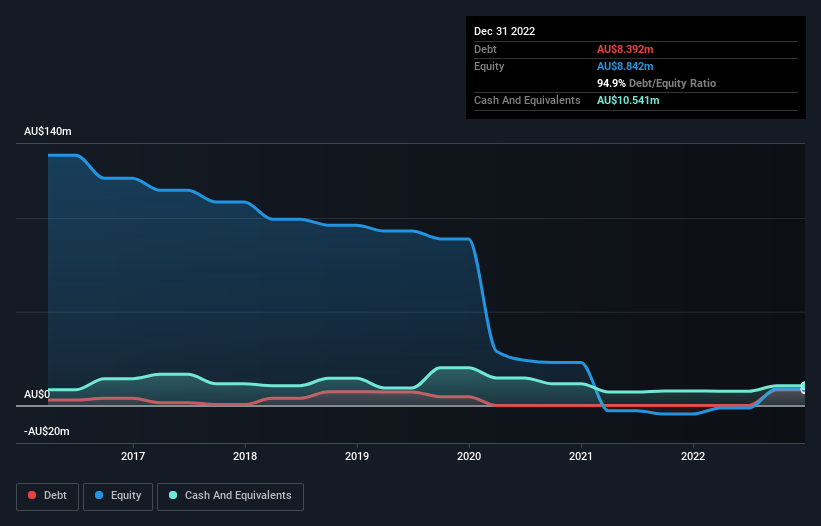- Australia
- /
- Energy Services
- /
- ASX:MCE
Does Matrix Composites & Engineering (ASX:MCE) Have A Healthy Balance Sheet?
The external fund manager backed by Berkshire Hathaway's Charlie Munger, Li Lu, makes no bones about it when he says 'The biggest investment risk is not the volatility of prices, but whether you will suffer a permanent loss of capital.' So it seems the smart money knows that debt - which is usually involved in bankruptcies - is a very important factor, when you assess how risky a company is. As with many other companies Matrix Composites & Engineering Ltd (ASX:MCE) makes use of debt. But the real question is whether this debt is making the company risky.
When Is Debt Dangerous?
Generally speaking, debt only becomes a real problem when a company can't easily pay it off, either by raising capital or with its own cash flow. Ultimately, if the company can't fulfill its legal obligations to repay debt, shareholders could walk away with nothing. While that is not too common, we often do see indebted companies permanently diluting shareholders because lenders force them to raise capital at a distressed price. Having said that, the most common situation is where a company manages its debt reasonably well - and to its own advantage. When we think about a company's use of debt, we first look at cash and debt together.
See our latest analysis for Matrix Composites & Engineering
What Is Matrix Composites & Engineering's Net Debt?
You can click the graphic below for the historical numbers, but it shows that as of December 2022 Matrix Composites & Engineering had AU$8.39m of debt, an increase on none, over one year. But on the other hand it also has AU$10.5m in cash, leading to a AU$2.15m net cash position.

A Look At Matrix Composites & Engineering's Liabilities
We can see from the most recent balance sheet that Matrix Composites & Engineering had liabilities of AU$13.5m falling due within a year, and liabilities of AU$37.4m due beyond that. On the other hand, it had cash of AU$10.5m and AU$6.98m worth of receivables due within a year. So its liabilities total AU$33.4m more than the combination of its cash and short-term receivables.
Matrix Composites & Engineering has a market capitalization of AU$67.9m, so it could very likely raise cash to ameliorate its balance sheet, if the need arose. But we definitely want to keep our eyes open to indications that its debt is bringing too much risk. Despite its noteworthy liabilities, Matrix Composites & Engineering boasts net cash, so it's fair to say it does not have a heavy debt load! There's no doubt that we learn most about debt from the balance sheet. But it is Matrix Composites & Engineering's earnings that will influence how the balance sheet holds up in the future. So when considering debt, it's definitely worth looking at the earnings trend. Click here for an interactive snapshot.
In the last year Matrix Composites & Engineering wasn't profitable at an EBIT level, but managed to grow its revenue by 15%, to AU$27m. We usually like to see faster growth from unprofitable companies, but each to their own.
So How Risky Is Matrix Composites & Engineering?
Although Matrix Composites & Engineering had an earnings before interest and tax (EBIT) loss over the last twelve months, it made a statutory profit of AU$9.1m. So taking that on face value, and considering the cash, we don't think its very risky in the near term. With revenue growth uninspiring, we'd really need to see some positive EBIT before mustering much enthusiasm for this business. There's no doubt that we learn most about debt from the balance sheet. However, not all investment risk resides within the balance sheet - far from it. We've identified 4 warning signs with Matrix Composites & Engineering , and understanding them should be part of your investment process.
If, after all that, you're more interested in a fast growing company with a rock-solid balance sheet, then check out our list of net cash growth stocks without delay.
New: Manage All Your Stock Portfolios in One Place
We've created the ultimate portfolio companion for stock investors, and it's free.
• Connect an unlimited number of Portfolios and see your total in one currency
• Be alerted to new Warning Signs or Risks via email or mobile
• Track the Fair Value of your stocks
Have feedback on this article? Concerned about the content? Get in touch with us directly. Alternatively, email editorial-team (at) simplywallst.com.
This article by Simply Wall St is general in nature. We provide commentary based on historical data and analyst forecasts only using an unbiased methodology and our articles are not intended to be financial advice. It does not constitute a recommendation to buy or sell any stock, and does not take account of your objectives, or your financial situation. We aim to bring you long-term focused analysis driven by fundamental data. Note that our analysis may not factor in the latest price-sensitive company announcements or qualitative material. Simply Wall St has no position in any stocks mentioned.
About ASX:MCE
Matrix Composites & Engineering
Engages in the design, manufacture, and supply of engineered composite products in Australia, Brazil, the United States, the United Kingdom, Japan, and internationally.
Reasonable growth potential with mediocre balance sheet.
Similar Companies
Market Insights
Weekly Picks


Crazy Undervalued 42 Baggers Silver Play (Active & Running Mine)


Fiducian: Compliance Clouds or Value Opportunity?

Willamette Valley Vineyards (WVVI): Not-So-Great Value
Recently Updated Narratives


ADNOC Gas future shines with a 21.4% revenue surge

Watch Pulse Seismic Outperform with 13.6% Revenue Growth in the Coming Years

Significantly undervalued gold explorer in Timmins, finally getting traction
Popular Narratives


MicroVision will explode future revenue by 380.37% with a vision towards success


NVDA: Expanding AI Demand Will Drive Major Data Center Investments Through 2026





